Travel Through The Democratic Republic Of Congo on a Harley-Davidson
By Peter & Kay Forwood
Democratic Republic Of Congo on a Harley (19/11/00 -
5/12/00)
Distance 1179 km (208275 km to 209454 km)
This is part of the Seventh section of our around the
world trip.
Complete Trip Overview & Map
Coming from The Democratic Republic Of Congo part 1
27/11/00 Sand flies overnight to add to the mosquitoes
and leeches. My boots haven't been dry since we entered Congo. Just as they
start to dry out another deep puddle soaks them. No rain last night but a
fog this morning and driving through tall grasses still wet and hanging over
the road. The road dry most of the day and flat, making travel much easier.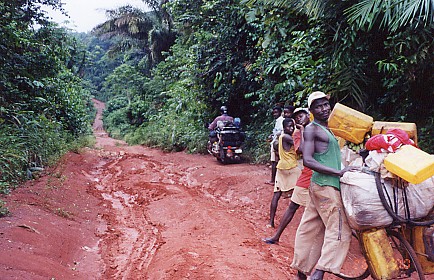 Covered another 143 km stopping 50 km short of Bambili/Dingila. Wamba dia
Wamba's rebel forces hold the Eastern side and Bemba forces hold the West
and with Kabila forces in the South you effectively have three Congo's.
The divide is at Poko where we were advised we needed a new travel document.
Actually the original one needed to be stamped by Bemba's immigration men.
The fact that the eight days had now expired didn't seem to concern them
but they insisted on $US 20.00 from each of us. I insisted on a receipt and
we compromised with them writing that the amount had been paid (on the travel
document) and was for transit through Bemba's territory. This is the transitional
zone. All day we saw only a few bicycle goods carriers as goods now arrive
in Congo via the Central African Republic and we are at the end of their
supply line. A payment is also necessary for them to cross into the neighbouring
territory, slowing commerce.
Covered another 143 km stopping 50 km short of Bambili/Dingila. Wamba dia
Wamba's rebel forces hold the Eastern side and Bemba forces hold the West
and with Kabila forces in the South you effectively have three Congo's.
The divide is at Poko where we were advised we needed a new travel document.
Actually the original one needed to be stamped by Bemba's immigration men.
The fact that the eight days had now expired didn't seem to concern them
but they insisted on $US 20.00 from each of us. I insisted on a receipt and
we compromised with them writing that the amount had been paid (on the travel
document) and was for transit through Bemba's territory. This is the transitional
zone. All day we saw only a few bicycle goods carriers as goods now arrive
in Congo via the Central African Republic and we are at the end of their
supply line. A payment is also necessary for them to cross into the neighbouring
territory, slowing commerce.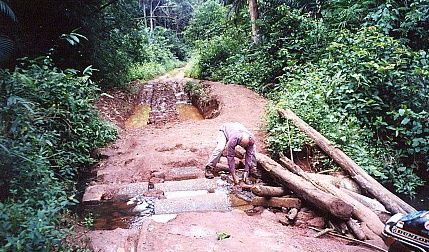 The day turned out to be incredibly steamy leading up to evening thunderstorms,
beautiful butterflies watered at puddles and we managed our first wash in
three days sheltered only by a few plants.
The day turned out to be incredibly steamy leading up to evening thunderstorms,
beautiful butterflies watered at puddles and we managed our first wash in
three days sheltered only by a few plants.
28/11/00 Just the edge of last nights thunderstorm and
the road relatively dry to start. Bambili is another decision time and we
crossed the rickety bridge only to be told the best route is via Ango. Back
across to be told the opposite, go via Buta as the river barge is broken and
only pirogues (dugout canoes) can cross here. Across again all the way to
Dingila about 5 km, insisted on no payment to enter town and found the people
here most unhelpful. Thinking they had a captive market petrol was priced
at $US 10.00 a litre, a small amount was generously offered at $US 3.00 a
litre. Change money 60 franc to the $, we have been getting 70 elsewhere.
We try to have enough local currency on hand so not to get caught having to
change to buy petrol.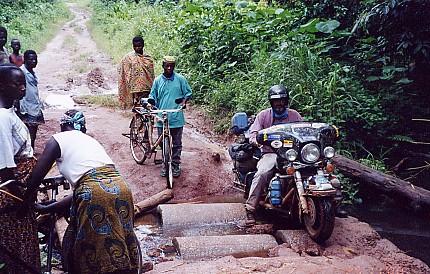 We were however advised by a pleasant English speaking gentleman that we
must not take the Buta road as it passes through dense rain forest, take
the Ango road. So we left town having conducted no commerce because of their
attitude and for the fourth time crossed the rickety bridge. We were advised
we needed three pirogue to cross the adjoining river (about 400m wide) with
the motorcycle balanced in the centre one, first quote $US 100.00. A nice
round number. It must be the scourge of the rich to be preyed upon by the
poor and beggars, perhaps a religious justice. The final price $US 6.50, still
double the normal price for three pirogue, but 10 people had to be paid and
they lifted the motorcycle to the middle one then sitting in the outboard
pirogues steadied the motorcycle one. The crossing was uneventful, heading
upstream into the strong current before landing and reversing the loading
procedure. The road to Ango even more remote and we were mobbed at a local
market a few km's along the road. Again everyone wanted to be in the photo.
Very few bicycles still, only two in 50 km, what people there are in this
remote area are walking.
We were however advised by a pleasant English speaking gentleman that we
must not take the Buta road as it passes through dense rain forest, take
the Ango road. So we left town having conducted no commerce because of their
attitude and for the fourth time crossed the rickety bridge. We were advised
we needed three pirogue to cross the adjoining river (about 400m wide) with
the motorcycle balanced in the centre one, first quote $US 100.00. A nice
round number. It must be the scourge of the rich to be preyed upon by the
poor and beggars, perhaps a religious justice. The final price $US 6.50, still
double the normal price for three pirogue, but 10 people had to be paid and
they lifted the motorcycle to the middle one then sitting in the outboard
pirogues steadied the motorcycle one. The crossing was uneventful, heading
upstream into the strong current before landing and reversing the loading
procedure. The road to Ango even more remote and we were mobbed at a local
market a few km's along the road. Again everyone wanted to be in the photo.
Very few bicycles still, only two in 50 km, what people there are in this
remote area are walking.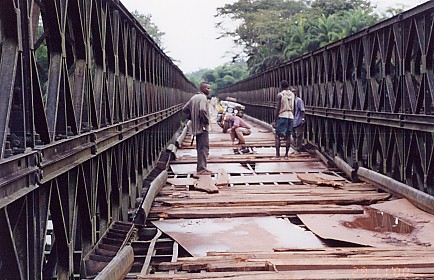 The road would have been OK but difficult had it not been for two trucks
having recently ploughed through all the puddles spreading muddy water all
over the road making the approaches slippery and digging up the road tracks
making them also slippery as only the bare surface had previously dried. Almost
no traffic has been on this road for months in the wet. We could see where
the trucks had removed numerous fallen branches and a couple of large trees
from the track. Tall grass still a problem overhanging the road blocking our
view and slapping us in the face with its mature grass seeds getting in our
eyes. Only 103 km today and we are camped in the church grounds of a non
existent village. The people here not living roadside as much and sparsely
populated. Each evenings camp, someone brings out chairs for us, a welcoming,
status symbol or the only thing they have to offer, we aren't sure.
The road would have been OK but difficult had it not been for two trucks
having recently ploughed through all the puddles spreading muddy water all
over the road making the approaches slippery and digging up the road tracks
making them also slippery as only the bare surface had previously dried. Almost
no traffic has been on this road for months in the wet. We could see where
the trucks had removed numerous fallen branches and a couple of large trees
from the track. Tall grass still a problem overhanging the road blocking our
view and slapping us in the face with its mature grass seeds getting in our
eyes. Only 103 km today and we are camped in the church grounds of a non
existent village. The people here not living roadside as much and sparsely
populated. Each evenings camp, someone brings out chairs for us, a welcoming,
status symbol or the only thing they have to offer, we aren't sure.
29/11/00 This has to be the poorest area anywhere we have
been in the world.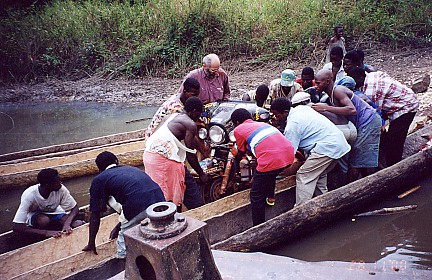 Small children have only lap laps from pieces of old materials and young
girls only a piece of material around their breasts. The boy who collected
clean water from the well about a km away for drinking and our splash bath
asked for clothes. Our only spares were T-shirts we carry as clean rags.
This oil stained shirt was better than anything we had seen here. He was
overjoyed by the gift. Probably one of the greatest presents to bring for
these people would be old clothes. I had been bitten on the bum by some insect
or beast and broke out in a soaking sweat in the evening for about four hours,
then it passed with no other ill effects. This area has seen better days.
Small stone and brick bridges span each creek, one even with a large old
wooden water wheel now buried to its axle in river sand. We learned that
the people moved away from the road two years ago with the S.P.L.A. fighting
Kabila forces in the area.
Small children have only lap laps from pieces of old materials and young
girls only a piece of material around their breasts. The boy who collected
clean water from the well about a km away for drinking and our splash bath
asked for clothes. Our only spares were T-shirts we carry as clean rags.
This oil stained shirt was better than anything we had seen here. He was
overjoyed by the gift. Probably one of the greatest presents to bring for
these people would be old clothes. I had been bitten on the bum by some insect
or beast and broke out in a soaking sweat in the evening for about four hours,
then it passed with no other ill effects. This area has seen better days.
Small stone and brick bridges span each creek, one even with a large old
wooden water wheel now buried to its axle in river sand. We learned that
the people moved away from the road two years ago with the S.P.L.A. fighting
Kabila forces in the area.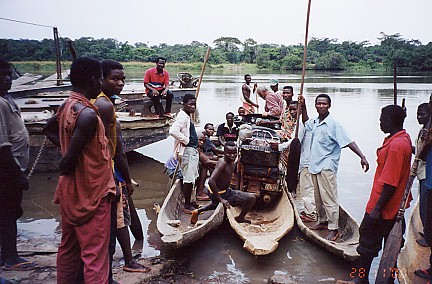 They moved deeper into the forest to avoid being press ganged or raped
and are only now just returning. The Ugandan Army was here (having driven
out the other two forces) assisting the Congo Liberation Forces and only
returned to Uganda last September as part of the UN peace initiatives. Congo
is surely the epitome of post independence African states when you look around
at the decline it has encountered. The road to Ango this morning, 55 km,
good other than the slipperiest red clay we have encountered. Still averaging
20 km per hour and dropping the motorcycle about five times (stopped counting)
Kay walking more. Occasionally on our stops we encounter troupes of monkeys
near the road. A big troupe this morning, like red colobus. We felt we were
the monkeys in the zoo after arriving at Ango mission and were allowed to
camp in a secluded area.
They moved deeper into the forest to avoid being press ganged or raped
and are only now just returning. The Ugandan Army was here (having driven
out the other two forces) assisting the Congo Liberation Forces and only
returned to Uganda last September as part of the UN peace initiatives. Congo
is surely the epitome of post independence African states when you look around
at the decline it has encountered. The road to Ango this morning, 55 km,
good other than the slipperiest red clay we have encountered. Still averaging
20 km per hour and dropping the motorcycle about five times (stopped counting)
Kay walking more. Occasionally on our stops we encounter troupes of monkeys
near the road. A big troupe this morning, like red colobus. We felt we were
the monkeys in the zoo after arriving at Ango mission and were allowed to
camp in a secluded area.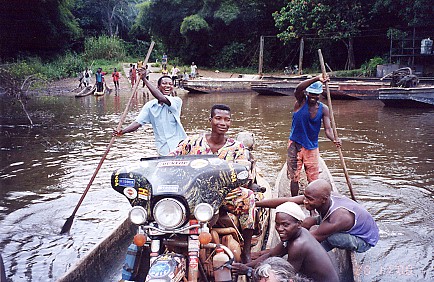 The students would come and look down on us from a raised balcony, watching
our every movement.
The students would come and look down on us from a raised balcony, watching
our every movement.
30/11/00 We had been told that there was plenty of petrol
in Ango and as we limped into town at the end of the reserve tank yesterday
we were anxious to obtain some. But apparently the supply route from the
C.A.R. had been cut about a month ago and word hadn't yet filtered through
into the country region where we had been travelling. Apparently Kabila obtained
a dislike for the C.A.R. and took their supply of petrol from the Congo River,
probably to prevent the flow of fuel into his enemies hands, where we now
are, without fuel. The only petrol arriving is still from Uganda, some 800
km away by bicycle. The priest at the mission has a radio and in true African
inefficiency is trying slowly to locate sufficient fuel for us to leave town.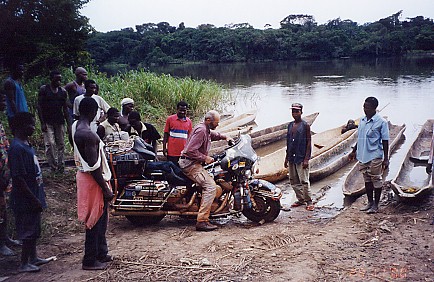 There is reportedly some coming about 200 km away that he may be able to
send a bicycle rider from here to intercept. There may be some arriving
in another town, tomorrow, about 100 km away. By night we were no further
advanced than yesterday afternoon when we arrived. There are apparently only
three motorcycles in town using petrol and only about 10 litres between them,
insufficient for us to get to Zemio in the C.A.R., where there probably isn't
any more fuel than here. The prospects of being stuck here for a week aren't
appealing. While interesting, a captive market, we are boosting the economy
and are concerned our injection of cash here may delay the production of
petrol supplies. Stricken by war only recently, ravaged and raped by the
Ugandan soldiers, there is little left and no money. Today we bought a live
chicken for 33 cents and the mission kitchen is preparing it for dinner.
There is reportedly some coming about 200 km away that he may be able to
send a bicycle rider from here to intercept. There may be some arriving
in another town, tomorrow, about 100 km away. By night we were no further
advanced than yesterday afternoon when we arrived. There are apparently only
three motorcycles in town using petrol and only about 10 litres between them,
insufficient for us to get to Zemio in the C.A.R., where there probably isn't
any more fuel than here. The prospects of being stuck here for a week aren't
appealing. While interesting, a captive market, we are boosting the economy
and are concerned our injection of cash here may delay the production of
petrol supplies. Stricken by war only recently, ravaged and raped by the
Ugandan soldiers, there is little left and no money. Today we bought a live
chicken for 33 cents and the mission kitchen is preparing it for dinner.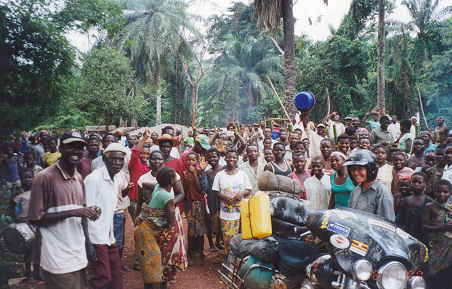
1/12/00 The big difference between the west and Africa
is that the west and Middle East try to solve problems and the Africans
try to take advantage of your problems. Upon mission advice we sent a bicyclist
67 km via a short cut route to Dingila where rumour has it there are new
supplies of petrol at $US 2.00 a litre. Plus the labour charge $US 10.00,
plus river crossing fees $US 1.00. He should be back tomorrow night, with
petrol? Again captive we have been ruthlessly targeted by the immigration
officials and managed to fend off the last two days assaults but this evening
we received a written request for our presence at 9 am tomorrow at their
office. The wording was strong, stating "illegal sorte", and threatening
police action if we fail to appear. Otherwise we spent the day organizing
another river crossing by pirogue just north of town when and if we are allowed
to leave.
2/12/00 By evening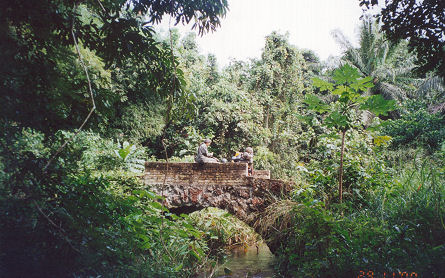 the promised petrol had not arrived. The bicyclist we
sent yesterday had not returned, nor had we received any radio message of
any difficulties he may be encountering. We were not surprised, just disappointed.
The workings here are amazingly inefficient. A truck loaded with mission
and town produce of grains and dried fish left for Isiro the day we arrived.
It was expected to take four days. They were short of oil, we offered two
litres that we had spare, but they left without it. Two days later a bicyclist
returned saying they had broken down just 65 km away, no oil. They immediately
sent our oil by motorcycle and after preparing another motorcycle to carry
a large truck tyre, two hours later, sent another one. Two motorcycles 260
km return trip, 13 litres of petrol at $US 2.00 a litre?, where we are getting
a load of washing done for 30c, and whole fish or chicken for the same. No
logic or forethought or thought of costs. It's difficult to comprehend. This
mornings two hour barrage with immigration equally as mystifying. Our assailant,
a 22 year experienced immigration officer from many corrupt past
the promised petrol had not arrived. The bicyclist we
sent yesterday had not returned, nor had we received any radio message of
any difficulties he may be encountering. We were not surprised, just disappointed.
The workings here are amazingly inefficient. A truck loaded with mission
and town produce of grains and dried fish left for Isiro the day we arrived.
It was expected to take four days. They were short of oil, we offered two
litres that we had spare, but they left without it. Two days later a bicyclist
returned saying they had broken down just 65 km away, no oil. They immediately
sent our oil by motorcycle and after preparing another motorcycle to carry
a large truck tyre, two hours later, sent another one. Two motorcycles 260
km return trip, 13 litres of petrol at $US 2.00 a litre?, where we are getting
a load of washing done for 30c, and whole fish or chicken for the same. No
logic or forethought or thought of costs. It's difficult to comprehend. This
mornings two hour barrage with immigration equally as mystifying. Our assailant,
a 22 year experienced immigration officer from many corrupt past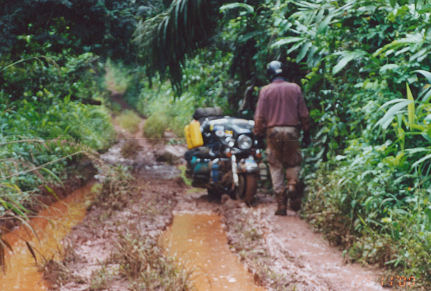 presidents of Congo where bribery was rampant. He has only been in this
post for a month, since the Ugandans left, walked for 700 km over 23 days
to get here and we are his first lucrative targets. When we received our
visas on entering Bemba territory in Poko, they had no forms and completed
the formalities on the back of our Wamba dia Wamba visa as it had all our
details, name, passport number, etc. already written. This was not adequate
for him and we required a new visa. We ended up in the priests office at
the Mission with the intention of radioing the capital Buta for instructions
to settle the impasse. It was not difficult to see who was the higher official
as the priest took over the situation and suggested immigration issue new
documents, without costs, as we had already paid at Poko. This took 30 minutes
of discussion. Immigration finally agreed to give them to us by late tonight.
We didn't see them today. An agreement in this part of Africa is no agreement,
even to a priest, and we expect problems getting the documents tomorrow.
On the positive side we have been supplied by traders coming to the mission
selling items of food. We have effectively invited ourselves to the
presidents of Congo where bribery was rampant. He has only been in this
post for a month, since the Ugandans left, walked for 700 km over 23 days
to get here and we are his first lucrative targets. When we received our
visas on entering Bemba territory in Poko, they had no forms and completed
the formalities on the back of our Wamba dia Wamba visa as it had all our
details, name, passport number, etc. already written. This was not adequate
for him and we required a new visa. We ended up in the priests office at
the Mission with the intention of radioing the capital Buta for instructions
to settle the impasse. It was not difficult to see who was the higher official
as the priest took over the situation and suggested immigration issue new
documents, without costs, as we had already paid at Poko. This took 30 minutes
of discussion. Immigration finally agreed to give them to us by late tonight.
We didn't see them today. An agreement in this part of Africa is no agreement,
even to a priest, and we expect problems getting the documents tomorrow.
On the positive side we have been supplied by traders coming to the mission
selling items of food. We have effectively invited ourselves to the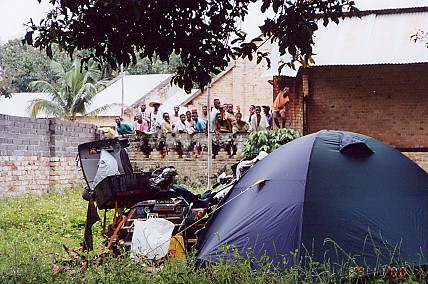 mission dining room by buying food for the kitchen which
then prepares it for the priests and us. The cook and three old pygmy helpers
are happy and fun in our dealings with negotiating the buying of produce.
But at the end of the fourth day we are more than ready to leave, with no
electricity or paraffin, everywhere is dark by 6.30 pm, the place is dead,
the mosquitoes and sand flies are about and we are hermits to our tent and
the BBC till dawn.
mission dining room by buying food for the kitchen which
then prepares it for the priests and us. The cook and three old pygmy helpers
are happy and fun in our dealings with negotiating the buying of produce.
But at the end of the fourth day we are more than ready to leave, with no
electricity or paraffin, everywhere is dark by 6.30 pm, the place is dead,
the mosquitoes and sand flies are about and we are hermits to our tent and
the BBC till dawn.
3/12/00 A motorcycle without petrol is like a hip pocket
in a singlet, useless. Stuck in the middle of the Congo, it looks pretty
but won't do a thing. Today the highlight was to cut my toenails having already
done the fingernails yesterday. Actually being Sunday there was a lot of activity
with the children in the afternoon performing school plays under the teak
trees next to the church. The main play was based on a local story. The martyrdom
of two nuns killed here four years ago, I think. The english interpretation
was a bit sketchy. Rebels dressed with leaves and toy guns attacked four
nuns dressed in white lab coats and knifed and shot one. Such is the freshness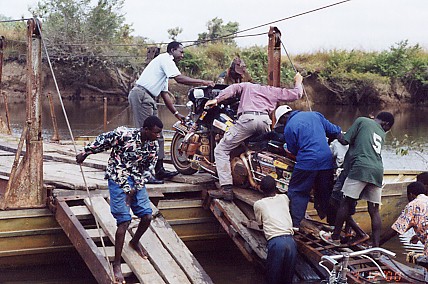 of this type of history in this area. Lo and behold our
bicyclist returned with a load of petrol late this evening. Being not worldly
he was ripped off more than necessary in both the dealings and the amount
of petrol. We judged him to be honest and he proved it by stating "that he
was a good Catholic"!! The petrol delivered was $US 2.70 a litre after allowing
for his expenses, poor exchange rate and being short changed and spilling
some petrol. Still after waiting four days we would probably have been prepared
to pay double that price.
of this type of history in this area. Lo and behold our
bicyclist returned with a load of petrol late this evening. Being not worldly
he was ripped off more than necessary in both the dealings and the amount
of petrol. We judged him to be honest and he proved it by stating "that he
was a good Catholic"!! The petrol delivered was $US 2.70 a litre after allowing
for his expenses, poor exchange rate and being short changed and spilling
some petrol. Still after waiting four days we would probably have been prepared
to pay double that price.
4/12/00 We awoke to the fourth day without rain and presumed
correctly that the road would be dry. Over breakfast with the priest he
agreed to have one last attempt to get the correct documents from the immigration
official, but he had decided not to honour his promise to the priest and
insisted on full payment of a new visa. We refused and arranged to leave
town without papers, partly expecting to be refused to leave. We had arranged
to have eight school boys to assist with the loading of the motorcycle onto
pirogues to cross the river at the edge of town. While we were waiting two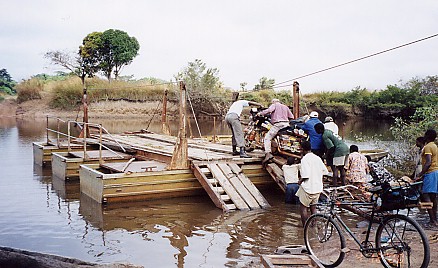 policemen, one with a rifle and an army man also
with a rifle approached us. To our surprise they had come to assist us with
the crossing. It appears the immigration man is the only outside government
representative and the locals wanted us to leave happily as tourists. They
considered the antiquated barge the best method to cross the river and while
loading, the motorcycle went within a whisker of falling off the ramp into
the water. About $US 4.00 for the crossing which in true African style took
an hour for a ten minute job. The dry road, about the best we have been
on in Congo lasted till Gwane about 80 km. Then it deteriorated to an overgrown
rocky track. The old lava fields creating most of the rock and with worse
again fuel (the further from the source the more times lower octanes can
be added) the motorcycle won't run hills without knocking and it runs on
after turning it off for quite a while. I now have to stop it by stalling
in first gear. Stopped at a village and asked to use their fire to cook
our lunch and while eating watched the women folk delousing each other, squeezing
them between
policemen, one with a rifle and an army man also
with a rifle approached us. To our surprise they had come to assist us with
the crossing. It appears the immigration man is the only outside government
representative and the locals wanted us to leave happily as tourists. They
considered the antiquated barge the best method to cross the river and while
loading, the motorcycle went within a whisker of falling off the ramp into
the water. About $US 4.00 for the crossing which in true African style took
an hour for a ten minute job. The dry road, about the best we have been
on in Congo lasted till Gwane about 80 km. Then it deteriorated to an overgrown
rocky track. The old lava fields creating most of the rock and with worse
again fuel (the further from the source the more times lower octanes can
be added) the motorcycle won't run hills without knocking and it runs on
after turning it off for quite a while. I now have to stop it by stalling
in first gear. Stopped at a village and asked to use their fire to cook
our lunch and while eating watched the women folk delousing each other, squeezing
them between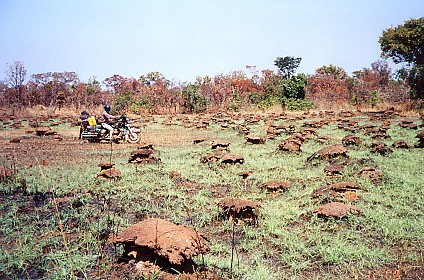 thumbnails. One boy had a nodulated, puffy blown
up leg, been that way for six months they said. We bush camped 20 km from
Gwane on a dry lava bed, the most secluded place we have been in Congo.
thumbnails. One boy had a nodulated, puffy blown
up leg, been that way for six months they said. We bush camped 20 km from
Gwane on a dry lava bed, the most secluded place we have been in Congo.
5/12/00 The morning was beautiful in our solitude, other
than a herd of buffalo where the male threatened to charge our noisy motorcycle,
but the road worse for the low slung H-D. Lava rocks protruded everywhere
and were difficult to see with grasses overhanging the road. Kay mounted
and dismounted as I manoeuvred the worst sections. The last 80 km to Zapay,
the last town in Congo, took five hours. To our amazement, totally shocked,
the immigration official in Ango had sent a motorcycle with a letter the
187 km to Zapay stating not to let us pass. This was sent three days earlier
and we had passed the messenger returning, being the only vehicle we saw
on the road. After discussions between Zapay immigration and the Customs officials
we agreed to pay $US 10.00 each to bring our incorrect visa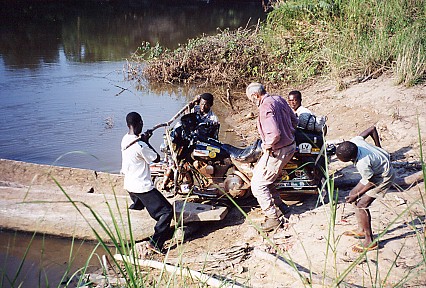 to the correct price. Not enough to cover the petrol
costs of the messenger motorcycle let alone its repairs etc. Such is the
logic of Africa. The next problem is the river crossing. Always in Africa
they charge what the market will bear. We are on Congo side and there are
only two pirogues to C.A.R. They know we can't go back as the road is almost
impossible and there is no other way to cross the river. Ridiculous prices,
finally agreed to $US 12.00. A difficult crossing in loading and unloading
the motorcycle, but glad to be out of Congo's roads and officials. In summary
we paid $US 30.00 visa fees each, for each of the two rebel held territories
we passed through. A $US 20.00 fee for paperwork for the motorcycle, and
receipts were given. No other payments were made to officials. A repressed
society that makes the people open and friendly and the officials corrupt.
Would we do the trip through Congo again? No. Knowing what we know now would
we have gone in the first place? Yes. The people contact far outweighed the
bad roads and officials. The motorcycle sustained more damage in the last
1180 km than in
to the correct price. Not enough to cover the petrol
costs of the messenger motorcycle let alone its repairs etc. Such is the
logic of Africa. The next problem is the river crossing. Always in Africa
they charge what the market will bear. We are on Congo side and there are
only two pirogues to C.A.R. They know we can't go back as the road is almost
impossible and there is no other way to cross the river. Ridiculous prices,
finally agreed to $US 12.00. A difficult crossing in loading and unloading
the motorcycle, but glad to be out of Congo's roads and officials. In summary
we paid $US 30.00 visa fees each, for each of the two rebel held territories
we passed through. A $US 20.00 fee for paperwork for the motorcycle, and
receipts were given. No other payments were made to officials. A repressed
society that makes the people open and friendly and the officials corrupt.
Would we do the trip through Congo again? No. Knowing what we know now would
we have gone in the first place? Yes. The people contact far outweighed the
bad roads and officials. The motorcycle sustained more damage in the last
1180 km than in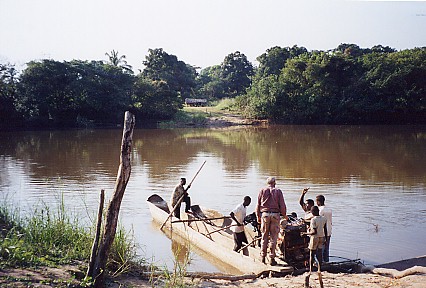 its previous 200,000 km. Broken mirror, dreadful fuel, broken
drive belt, dented mudguard and damage to the underside from rocks and loading
into and out of pirogues.
its previous 200,000 km. Broken mirror, dreadful fuel, broken
drive belt, dented mudguard and damage to the underside from rocks and loading
into and out of pirogues.
Move with us to Central African
Republic
 Covered another 143 km stopping 50 km short of Bambili/Dingila. Wamba dia
Wamba's rebel forces hold the Eastern side and Bemba forces hold the West
and with Kabila forces in the South you effectively have three Congo's.
The divide is at Poko where we were advised we needed a new travel document.
Actually the original one needed to be stamped by Bemba's immigration men.
The fact that the eight days had now expired didn't seem to concern them
but they insisted on $US 20.00 from each of us. I insisted on a receipt and
we compromised with them writing that the amount had been paid (on the travel
document) and was for transit through Bemba's territory. This is the transitional
zone. All day we saw only a few bicycle goods carriers as goods now arrive
in Congo via the Central African Republic and we are at the end of their
supply line. A payment is also necessary for them to cross into the neighbouring
territory, slowing commerce.
Covered another 143 km stopping 50 km short of Bambili/Dingila. Wamba dia
Wamba's rebel forces hold the Eastern side and Bemba forces hold the West
and with Kabila forces in the South you effectively have three Congo's.
The divide is at Poko where we were advised we needed a new travel document.
Actually the original one needed to be stamped by Bemba's immigration men.
The fact that the eight days had now expired didn't seem to concern them
but they insisted on $US 20.00 from each of us. I insisted on a receipt and
we compromised with them writing that the amount had been paid (on the travel
document) and was for transit through Bemba's territory. This is the transitional
zone. All day we saw only a few bicycle goods carriers as goods now arrive
in Congo via the Central African Republic and we are at the end of their
supply line. A payment is also necessary for them to cross into the neighbouring
territory, slowing commerce. The day turned out to be incredibly steamy leading up to evening thunderstorms,
beautiful butterflies watered at puddles and we managed our first wash in
three days sheltered only by a few plants.
The day turned out to be incredibly steamy leading up to evening thunderstorms,
beautiful butterflies watered at puddles and we managed our first wash in
three days sheltered only by a few plants.  We were however advised by a pleasant English speaking gentleman that we
must not take the Buta road as it passes through dense rain forest, take
the Ango road. So we left town having conducted no commerce because of their
attitude and for the fourth time crossed the rickety bridge. We were advised
we needed three pirogue to cross the adjoining river (about 400m wide) with
the motorcycle balanced in the centre one, first quote $US 100.00. A nice
round number. It must be the scourge of the rich to be preyed upon by the
poor and beggars, perhaps a religious justice. The final price $US 6.50, still
double the normal price for three pirogue, but 10 people had to be paid and
they lifted the motorcycle to the middle one then sitting in the outboard
pirogues steadied the motorcycle one. The crossing was uneventful, heading
upstream into the strong current before landing and reversing the loading
procedure. The road to Ango even more remote and we were mobbed at a local
market a few km's along the road. Again everyone wanted to be in the photo.
Very few bicycles still, only two in 50 km, what people there are in this
remote area are walking.
We were however advised by a pleasant English speaking gentleman that we
must not take the Buta road as it passes through dense rain forest, take
the Ango road. So we left town having conducted no commerce because of their
attitude and for the fourth time crossed the rickety bridge. We were advised
we needed three pirogue to cross the adjoining river (about 400m wide) with
the motorcycle balanced in the centre one, first quote $US 100.00. A nice
round number. It must be the scourge of the rich to be preyed upon by the
poor and beggars, perhaps a religious justice. The final price $US 6.50, still
double the normal price for three pirogue, but 10 people had to be paid and
they lifted the motorcycle to the middle one then sitting in the outboard
pirogues steadied the motorcycle one. The crossing was uneventful, heading
upstream into the strong current before landing and reversing the loading
procedure. The road to Ango even more remote and we were mobbed at a local
market a few km's along the road. Again everyone wanted to be in the photo.
Very few bicycles still, only two in 50 km, what people there are in this
remote area are walking. The road would have been OK but difficult had it not been for two trucks
having recently ploughed through all the puddles spreading muddy water all
over the road making the approaches slippery and digging up the road tracks
making them also slippery as only the bare surface had previously dried. Almost
no traffic has been on this road for months in the wet. We could see where
the trucks had removed numerous fallen branches and a couple of large trees
from the track. Tall grass still a problem overhanging the road blocking our
view and slapping us in the face with its mature grass seeds getting in our
eyes. Only 103 km today and we are camped in the church grounds of a non
existent village. The people here not living roadside as much and sparsely
populated. Each evenings camp, someone brings out chairs for us, a welcoming,
status symbol or the only thing they have to offer, we aren't sure.
The road would have been OK but difficult had it not been for two trucks
having recently ploughed through all the puddles spreading muddy water all
over the road making the approaches slippery and digging up the road tracks
making them also slippery as only the bare surface had previously dried. Almost
no traffic has been on this road for months in the wet. We could see where
the trucks had removed numerous fallen branches and a couple of large trees
from the track. Tall grass still a problem overhanging the road blocking our
view and slapping us in the face with its mature grass seeds getting in our
eyes. Only 103 km today and we are camped in the church grounds of a non
existent village. The people here not living roadside as much and sparsely
populated. Each evenings camp, someone brings out chairs for us, a welcoming,
status symbol or the only thing they have to offer, we aren't sure.
 Small children have only lap laps from pieces of old materials and young
girls only a piece of material around their breasts. The boy who collected
clean water from the well about a km away for drinking and our splash bath
asked for clothes. Our only spares were T-shirts we carry as clean rags.
This oil stained shirt was better than anything we had seen here. He was
overjoyed by the gift. Probably one of the greatest presents to bring for
these people would be old clothes. I had been bitten on the bum by some insect
or beast and broke out in a soaking sweat in the evening for about four hours,
then it passed with no other ill effects. This area has seen better days.
Small stone and brick bridges span each creek, one even with a large old
wooden water wheel now buried to its axle in river sand. We learned that
the people moved away from the road two years ago with the S.P.L.A. fighting
Kabila forces in the area.
Small children have only lap laps from pieces of old materials and young
girls only a piece of material around their breasts. The boy who collected
clean water from the well about a km away for drinking and our splash bath
asked for clothes. Our only spares were T-shirts we carry as clean rags.
This oil stained shirt was better than anything we had seen here. He was
overjoyed by the gift. Probably one of the greatest presents to bring for
these people would be old clothes. I had been bitten on the bum by some insect
or beast and broke out in a soaking sweat in the evening for about four hours,
then it passed with no other ill effects. This area has seen better days.
Small stone and brick bridges span each creek, one even with a large old
wooden water wheel now buried to its axle in river sand. We learned that
the people moved away from the road two years ago with the S.P.L.A. fighting
Kabila forces in the area. They moved deeper into the forest to avoid being press ganged or raped
and are only now just returning. The Ugandan Army was here (having driven
out the other two forces) assisting the Congo Liberation Forces and only
returned to Uganda last September as part of the UN peace initiatives. Congo
is surely the epitome of post independence African states when you look around
at the decline it has encountered. The road to Ango this morning, 55 km,
good other than the slipperiest red clay we have encountered. Still averaging
20 km per hour and dropping the motorcycle about five times (stopped counting)
Kay walking more. Occasionally on our stops we encounter troupes of monkeys
near the road. A big troupe this morning, like red colobus. We felt we were
the monkeys in the zoo after arriving at Ango mission and were allowed to
camp in a secluded area.
They moved deeper into the forest to avoid being press ganged or raped
and are only now just returning. The Ugandan Army was here (having driven
out the other two forces) assisting the Congo Liberation Forces and only
returned to Uganda last September as part of the UN peace initiatives. Congo
is surely the epitome of post independence African states when you look around
at the decline it has encountered. The road to Ango this morning, 55 km,
good other than the slipperiest red clay we have encountered. Still averaging
20 km per hour and dropping the motorcycle about five times (stopped counting)
Kay walking more. Occasionally on our stops we encounter troupes of monkeys
near the road. A big troupe this morning, like red colobus. We felt we were
the monkeys in the zoo after arriving at Ango mission and were allowed to
camp in a secluded area. The students would come and look down on us from a raised balcony, watching
our every movement.
The students would come and look down on us from a raised balcony, watching
our every movement.  There is reportedly some coming about 200 km away that he may be able to
send a bicycle rider from here to intercept. There may be some arriving
in another town, tomorrow, about 100 km away. By night we were no further
advanced than yesterday afternoon when we arrived. There are apparently only
three motorcycles in town using petrol and only about 10 litres between them,
insufficient for us to get to Zemio in the C.A.R., where there probably isn't
any more fuel than here. The prospects of being stuck here for a week aren't
appealing. While interesting, a captive market, we are boosting the economy
and are concerned our injection of cash here may delay the production of
petrol supplies. Stricken by war only recently, ravaged and raped by the
Ugandan soldiers, there is little left and no money. Today we bought a live
chicken for 33 cents and the mission kitchen is preparing it for dinner.
There is reportedly some coming about 200 km away that he may be able to
send a bicycle rider from here to intercept. There may be some arriving
in another town, tomorrow, about 100 km away. By night we were no further
advanced than yesterday afternoon when we arrived. There are apparently only
three motorcycles in town using petrol and only about 10 litres between them,
insufficient for us to get to Zemio in the C.A.R., where there probably isn't
any more fuel than here. The prospects of being stuck here for a week aren't
appealing. While interesting, a captive market, we are boosting the economy
and are concerned our injection of cash here may delay the production of
petrol supplies. Stricken by war only recently, ravaged and raped by the
Ugandan soldiers, there is little left and no money. Today we bought a live
chicken for 33 cents and the mission kitchen is preparing it for dinner.
 the promised petrol had not arrived. The bicyclist we
sent yesterday had not returned, nor had we received any radio message of
any difficulties he may be encountering. We were not surprised, just disappointed.
The workings here are amazingly inefficient. A truck loaded with mission
and town produce of grains and dried fish left for Isiro the day we arrived.
It was expected to take four days. They were short of oil, we offered two
litres that we had spare, but they left without it. Two days later a bicyclist
returned saying they had broken down just 65 km away, no oil. They immediately
sent our oil by motorcycle and after preparing another motorcycle to carry
a large truck tyre, two hours later, sent another one. Two motorcycles 260
km return trip, 13 litres of petrol at $US 2.00 a litre?, where we are getting
a load of washing done for 30c, and whole fish or chicken for the same. No
logic or forethought or thought of costs. It's difficult to comprehend. This
mornings two hour barrage with immigration equally as mystifying. Our assailant,
a 22 year experienced immigration officer from many corrupt past
the promised petrol had not arrived. The bicyclist we
sent yesterday had not returned, nor had we received any radio message of
any difficulties he may be encountering. We were not surprised, just disappointed.
The workings here are amazingly inefficient. A truck loaded with mission
and town produce of grains and dried fish left for Isiro the day we arrived.
It was expected to take four days. They were short of oil, we offered two
litres that we had spare, but they left without it. Two days later a bicyclist
returned saying they had broken down just 65 km away, no oil. They immediately
sent our oil by motorcycle and after preparing another motorcycle to carry
a large truck tyre, two hours later, sent another one. Two motorcycles 260
km return trip, 13 litres of petrol at $US 2.00 a litre?, where we are getting
a load of washing done for 30c, and whole fish or chicken for the same. No
logic or forethought or thought of costs. It's difficult to comprehend. This
mornings two hour barrage with immigration equally as mystifying. Our assailant,
a 22 year experienced immigration officer from many corrupt past presidents of Congo where bribery was rampant. He has only been in this
post for a month, since the Ugandans left, walked for 700 km over 23 days
to get here and we are his first lucrative targets. When we received our
visas on entering Bemba territory in Poko, they had no forms and completed
the formalities on the back of our Wamba dia Wamba visa as it had all our
details, name, passport number, etc. already written. This was not adequate
for him and we required a new visa. We ended up in the priests office at
the Mission with the intention of radioing the capital Buta for instructions
to settle the impasse. It was not difficult to see who was the higher official
as the priest took over the situation and suggested immigration issue new
documents, without costs, as we had already paid at Poko. This took 30 minutes
of discussion. Immigration finally agreed to give them to us by late tonight.
We didn't see them today. An agreement in this part of Africa is no agreement,
even to a priest, and we expect problems getting the documents tomorrow.
On the positive side we have been supplied by traders coming to the mission
selling items of food. We have effectively invited ourselves to the
presidents of Congo where bribery was rampant. He has only been in this
post for a month, since the Ugandans left, walked for 700 km over 23 days
to get here and we are his first lucrative targets. When we received our
visas on entering Bemba territory in Poko, they had no forms and completed
the formalities on the back of our Wamba dia Wamba visa as it had all our
details, name, passport number, etc. already written. This was not adequate
for him and we required a new visa. We ended up in the priests office at
the Mission with the intention of radioing the capital Buta for instructions
to settle the impasse. It was not difficult to see who was the higher official
as the priest took over the situation and suggested immigration issue new
documents, without costs, as we had already paid at Poko. This took 30 minutes
of discussion. Immigration finally agreed to give them to us by late tonight.
We didn't see them today. An agreement in this part of Africa is no agreement,
even to a priest, and we expect problems getting the documents tomorrow.
On the positive side we have been supplied by traders coming to the mission
selling items of food. We have effectively invited ourselves to the mission dining room by buying food for the kitchen which
then prepares it for the priests and us. The cook and three old pygmy helpers
are happy and fun in our dealings with negotiating the buying of produce.
But at the end of the fourth day we are more than ready to leave, with no
electricity or paraffin, everywhere is dark by 6.30 pm, the place is dead,
the mosquitoes and sand flies are about and we are hermits to our tent and
the BBC till dawn.
mission dining room by buying food for the kitchen which
then prepares it for the priests and us. The cook and three old pygmy helpers
are happy and fun in our dealings with negotiating the buying of produce.
But at the end of the fourth day we are more than ready to leave, with no
electricity or paraffin, everywhere is dark by 6.30 pm, the place is dead,
the mosquitoes and sand flies are about and we are hermits to our tent and
the BBC till dawn.  of this type of history in this area. Lo and behold our
bicyclist returned with a load of petrol late this evening. Being not worldly
he was ripped off more than necessary in both the dealings and the amount
of petrol. We judged him to be honest and he proved it by stating "that he
was a good Catholic"!! The petrol delivered was $US 2.70 a litre after allowing
for his expenses, poor exchange rate and being short changed and spilling
some petrol. Still after waiting four days we would probably have been prepared
to pay double that price.
of this type of history in this area. Lo and behold our
bicyclist returned with a load of petrol late this evening. Being not worldly
he was ripped off more than necessary in both the dealings and the amount
of petrol. We judged him to be honest and he proved it by stating "that he
was a good Catholic"!! The petrol delivered was $US 2.70 a litre after allowing
for his expenses, poor exchange rate and being short changed and spilling
some petrol. Still after waiting four days we would probably have been prepared
to pay double that price.  policemen, one with a rifle and an army man also
with a rifle approached us. To our surprise they had come to assist us with
the crossing. It appears the immigration man is the only outside government
representative and the locals wanted us to leave happily as tourists. They
considered the antiquated barge the best method to cross the river and while
loading, the motorcycle went within a whisker of falling off the ramp into
the water. About $US 4.00 for the crossing which in true African style took
an hour for a ten minute job. The dry road, about the best we have been
on in Congo lasted till Gwane about 80 km. Then it deteriorated to an overgrown
rocky track. The old lava fields creating most of the rock and with worse
again fuel (the further from the source the more times lower octanes can
be added) the motorcycle won't run hills without knocking and it runs on
after turning it off for quite a while. I now have to stop it by stalling
in first gear. Stopped at a village and asked to use their fire to cook
our lunch and while eating watched the women folk delousing each other, squeezing
them between
policemen, one with a rifle and an army man also
with a rifle approached us. To our surprise they had come to assist us with
the crossing. It appears the immigration man is the only outside government
representative and the locals wanted us to leave happily as tourists. They
considered the antiquated barge the best method to cross the river and while
loading, the motorcycle went within a whisker of falling off the ramp into
the water. About $US 4.00 for the crossing which in true African style took
an hour for a ten minute job. The dry road, about the best we have been
on in Congo lasted till Gwane about 80 km. Then it deteriorated to an overgrown
rocky track. The old lava fields creating most of the rock and with worse
again fuel (the further from the source the more times lower octanes can
be added) the motorcycle won't run hills without knocking and it runs on
after turning it off for quite a while. I now have to stop it by stalling
in first gear. Stopped at a village and asked to use their fire to cook
our lunch and while eating watched the women folk delousing each other, squeezing
them between thumbnails. One boy had a nodulated, puffy blown
up leg, been that way for six months they said. We bush camped 20 km from
Gwane on a dry lava bed, the most secluded place we have been in Congo.
thumbnails. One boy had a nodulated, puffy blown
up leg, been that way for six months they said. We bush camped 20 km from
Gwane on a dry lava bed, the most secluded place we have been in Congo.
 to the correct price. Not enough to cover the petrol
costs of the messenger motorcycle let alone its repairs etc. Such is the
logic of Africa. The next problem is the river crossing. Always in Africa
they charge what the market will bear. We are on Congo side and there are
only two pirogues to C.A.R. They know we can't go back as the road is almost
impossible and there is no other way to cross the river. Ridiculous prices,
finally agreed to $US 12.00. A difficult crossing in loading and unloading
the motorcycle, but glad to be out of Congo's roads and officials. In summary
we paid $US 30.00 visa fees each, for each of the two rebel held territories
we passed through. A $US 20.00 fee for paperwork for the motorcycle, and
receipts were given. No other payments were made to officials. A repressed
society that makes the people open and friendly and the officials corrupt.
Would we do the trip through Congo again? No. Knowing what we know now would
we have gone in the first place? Yes. The people contact far outweighed the
bad roads and officials. The motorcycle sustained more damage in the last
1180 km than in
to the correct price. Not enough to cover the petrol
costs of the messenger motorcycle let alone its repairs etc. Such is the
logic of Africa. The next problem is the river crossing. Always in Africa
they charge what the market will bear. We are on Congo side and there are
only two pirogues to C.A.R. They know we can't go back as the road is almost
impossible and there is no other way to cross the river. Ridiculous prices,
finally agreed to $US 12.00. A difficult crossing in loading and unloading
the motorcycle, but glad to be out of Congo's roads and officials. In summary
we paid $US 30.00 visa fees each, for each of the two rebel held territories
we passed through. A $US 20.00 fee for paperwork for the motorcycle, and
receipts were given. No other payments were made to officials. A repressed
society that makes the people open and friendly and the officials corrupt.
Would we do the trip through Congo again? No. Knowing what we know now would
we have gone in the first place? Yes. The people contact far outweighed the
bad roads and officials. The motorcycle sustained more damage in the last
1180 km than in its previous 200,000 km. Broken mirror, dreadful fuel, broken
drive belt, dented mudguard and damage to the underside from rocks and loading
into and out of pirogues.
its previous 200,000 km. Broken mirror, dreadful fuel, broken
drive belt, dented mudguard and damage to the underside from rocks and loading
into and out of pirogues.